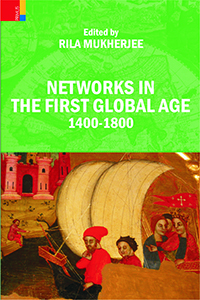
INFORMATION
- AUTHOR : Rila Mukherjee
- HB ISBN : 978-93-80607-09-2
- Year : 2011
- Extent : xxvi + 384 pp.
- Discount available on checkout
- Usually dispatched within 3 to 5 working days.
Networks in the First Global Age: 1400-1800
| HB ₹ 1395 . $ . ₤ |
||
INFORMATION
- AUTHOR –
- ISBN – 978-93-80607-09-2
- Year – 2011
- Extent: 400 + 40 coloured illustrations
- 10% discount + free shipping
- Usually dispatched within 3 to 5 working days.
The dynamics of the maritime world has held the fascination of researchers and scholars of history for long. Viewing the waterscapes as conduits of much economic and cultural sharing between peoples and lands, the focus of Networks in the First Global Age: 1400-1800 is on the oceans and seas—the Indian, the Atlantic and the Pacific Oceans and the Mediterranean Sea—and economic, military and cultural transmissions within and across them.The book shows how conventional arguments in history writing about the rise of theWest, the hegemon of the State and the might of overseas colonial empires can beoverturned by emphasizing on dynamic, collaborative, nonlinear networks as opposed toformal networks based on hierarchy. Such networks signal a completely different pictureabout global interactions in the period 1400-1800, emphasizing the centrality of peoples andcommodities at different times in different parts of the world. More importantly, the bookchallenges chronological readings and urges us to think spatially instead.With contributions from Indian, American, French and Iberian scholars, Networks in the First Global Age: 1400-1800 tells us what happens when the sea of history meets the sea ofnetwork analysis.
The Editor
Rila Mukherjee is Professor and Head, Department of History, School of Social Sciences, University of Hyderabad, Hyderabad, India. Her specialization is on the silk trade and traders in pre-colonial Bengal. She is the author of Strange Riches: Bengal in the Mercantile Map of South Asia (2006) and Merchants and Companies in Bengal: Kasimbazar and Jugdia in the Eighteenth Century (2006).
Contributors
Amândio Jorge MoraisBarros l Ernestine Carreira l David Alonso García l Rattan Lal
Hangloo l Srijan Sandip Mandal l Rila Mukherjee l Antoni Picazo Muntaner l J.B. Owens l Amélia Polónia l Ana Crespo Solana l Alex M. Thomas l Timothy D. Walker
‘The story of Kasimbazar’s networks is one of many networks described in a remarkable book, Networks in the First Global Age 1400-1800 … It contains contributions from Indian, French, Iberian and American scholars. It studies networks such as the one in the Portuguese city of Porto which linked the Asian and Atlantic networks, the one in Ladakh which linked South and Central Asian markets, … Its central assumption is that to understand the flow of historical events you need to study the networks in operation and the nature of connectivity among these networks. This is a dramatic departure from earlier historical methods which would have viewed, … events in the ‘small world’ Kasimbazar as deriving from its role as a small town in a larger empire, the Mughal, or to view it as a participant in the events in a particular period, that is, the 17th and 18th centuries.’— AJIT BALAKRISHNAN, Business Standard.
Ajit Balakrishnan is founder and CEO of Rediff.com
and also Chairman, Governing Council, IIM-C
The dynamics of the maritime world has held the fascination of researchers and scholars of history for long. Viewing the waterscapes as conduits of much economic and cultural sharing between peoples and lands, the focus of Networks in the First Global Age: 1400-1800 is on the oceans and seas—the Indian, the Atlantic and the Pacific Oceans and the Mediterranean Sea—and economic, military and cultural transmissions within and across them.The book shows how conventional arguments in history writing about the rise of theWest, the hegemon of the State and the might of overseas colonial empires can beoverturned by emphasizing on dynamic, collaborative, nonlinear networks as opposed toformal networks based on hierarchy. Such networks signal a completely different pictureabout global interactions in the period 1400-1800, emphasizing the centrality of peoples andcommodities at different times in different parts of the world. More importantly, the bookchallenges chronological readings and urges us to think spatially instead.With contributions from Indian, American, French and Iberian scholars, Networks in the First Global Age: 1400-1800 tells us what happens when the sea of history meets the sea ofnetwork analysis.
The Editor
Rila Mukherjee is Professor and Head, Department of History, School of Social Sciences, University of Hyderabad, Hyderabad, India. Her specialization is on the silk trade and traders in pre-colonial Bengal. She is the author of Strange Riches: Bengal in the Mercantile Map of South Asia (2006) and Merchants and Companies in Bengal: Kasimbazar and Jugdia in the Eighteenth Century (2006).
Contributors
Amândio Jorge MoraisBarros l Ernestine Carreira l David Alonso García l Rattan Lal
Hangloo l Srijan Sandip Mandal l Rila Mukherjee l Antoni Picazo Muntaner l J.B. Owens l Amélia Polónia l Ana Crespo Solana l Alex M. Thomas l Timothy D. Walker
‘The story of Kasimbazar’s networks is one of many networks described in a remarkable book, Networks in the First Global Age 1400-1800 … It contains contributions from Indian, French, Iberian and American scholars. It studies networks such as the one in the Portuguese city of Porto which linked the Asian and Atlantic networks, the one in Ladakh which linked South and Central Asian markets, … Its central assumption is that to understand the flow of historical events you need to study the networks in operation and the nature of connectivity among these networks. This is a dramatic departure from earlier historical methods which would have viewed, … events in the ‘small world’ Kasimbazar as deriving from its role as a small town in a larger empire, the Mughal, or to view it as a participant in the events in a particular period, that is, the 17th and 18th centuries.’— AJIT BALAKRISHNAN, Business Standard.
Ajit Balakrishnan is founder and CEO of Rediff.com
and also Chairman, Governing Council, IIM-C




